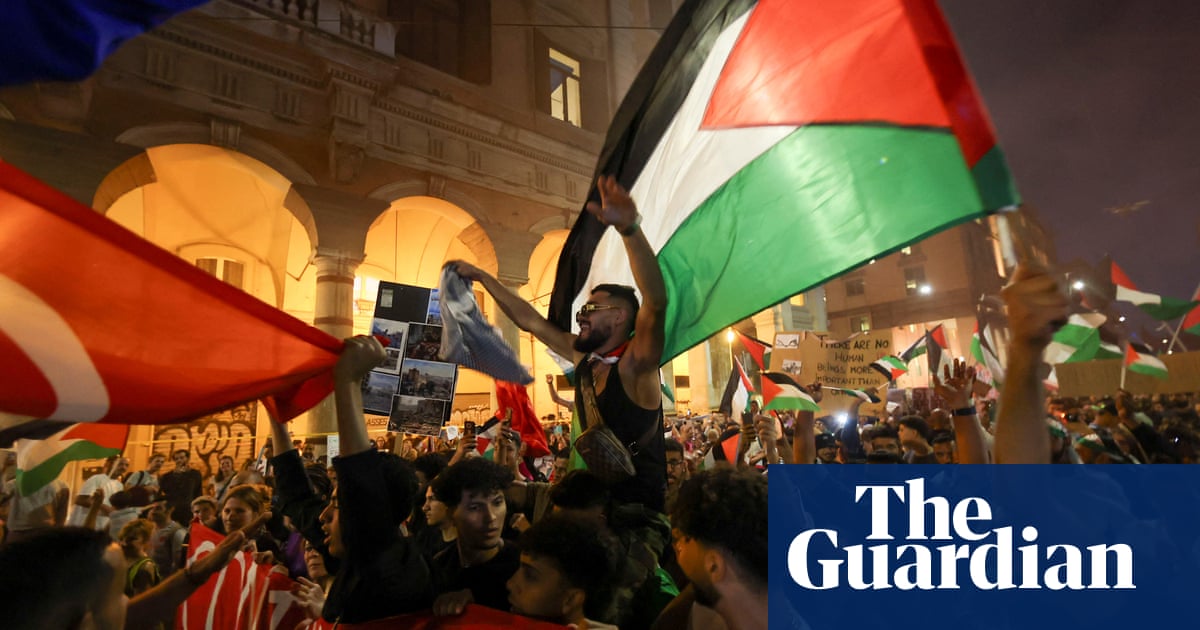
Any passing American might have been forgiven for thinking they had stumbled on one of the great human rights struggles of our time.
The speakers managed to mention Martin Luther King, Gandhi and the Nazi persecution of Jewish people. They told of prisoners held in conditions with echoes of the Soviet gulags.
Then there was the sheer injustice of the roundups. Innocent people spirited away by secret police for daring to criticise the government.
Except this was a protest to demand the release of hundreds of people arrested for their part in the storming of the US Capitol on 6 January, in an attempt to stop Congress certifying Joe Biden’s victory in the 2020 presidential election.
As the Republican party and Donald Trump’s more ardent supporters work to rewrite the narrative of the attempted coup, supporters of those arrested over it sought to turn it from a political to a human rights issue with the “Justice for J6” rally near the Capitol on Saturday.
As a protest, it was a flop.
Turnout was at best half of the 700 predicted by organisers, which in itself fell well short of the many thousands who stormed Congress in January. The event organiser, Matt Braynard, a former Trump campaign operative, blamed the poor attendance on government intimidation and press scaremongering.
“For those who turned out, I congratulate you on your courage,” he said.
That set a broad tone for a rally which sought to portray those arrested as brave Americans standing up for their democratic right to protest. No mention was made of the part played by Trump on 6 January when he urged supporters to “fight like hell” to defend his claim to have won the election.
About 650 people have been charged with offences over the riot and nearly 60 have pleaded guilty, mostly to relatively minor crimes including obstruction of official proceedings and illegally demonstrating in the Capitol. Some are held without bail.
Four people died during the riot, including a woman shot by a police officer as she tried to get on to the floor of the House. Brian Sicknick, a Capitol police officer attacked by the protesters, died the next day. Other officers were beaten.
Braynard insisted he had no truck with those arrested for violence against the police.
“That’s not what this rally is about,” he said. “It’s not about the people who were violent.”
Instead, he attacked a “two-tier justice system” that let liberals such as Congresswoman Alexandria Ocasio-Cortez and environmentalists protest inside the Capitol by occupying Nancy Pelosi’s office, but rounded up a few hundred people simply trying to get the government to hear their complaint about the election count.
“This is about disparate treatment of the non-violent people,” he said.
Braynard lamented the violence of the system against protesters who were “having their lives destroyed”. It was time, he said, for good men and women to cry: “Let them go.”
Speakers told of family members arrested by the FBI who were now “political detainees” and “prisoners of conscience”.
A woman who identified herself as the girlfriend of Jonathan Mellis, a man charged with crimes including assault, said he was being held in solitary confinement. She read a letter in which he claimed: “This reminds me of how the Jews were treated by the Nazis.”
The rally organisers, Look Ahead America, told people attending not to wear paraphernalia in support of Trump or political groups, in order to keep the focus on the claim to be about human rights.
Braynard spotted a man who identified himself as Adam from Florida holding an American flag with with the Roman numeral III in the corner. That, said Braynard, was a symbol for a far-right militia, the Three Percenters.
“It’s an outside group and it makes the optics look bad,” he said, telling Adam to put the flag away. “Anyone who doesn’t agree to take it down we have to assume is an infiltrator.”
Adam professed ignorance of the association – but rolled the flag up.
Anders Bruce, a 30 year-old organiser with Look Ahead America, said he was there to seek justice for “prisoners of conscience” subject to political persecution.
But who is responsible for that persecution when the prosecutions began under the Trump administration?
“It shows that it’s a problem with the government under both political parties,” he said.
Others turned out to protest against the protesters.
Doug Hughes stood in the midst of the prisoners’ supporters with a sign: “There is no right of insurrection.”
Hughes, a former postman, went to prison for four months for landing a gyrocopter in front of the Capitol in 2015, seeking to deliver letters to members of Congress professing objections to corporate money corrupting American politics.
“I knew that there would be consequences. I’m a felon, I lost my job, and I do not regret anything I did,” he said. “Now those people who broke the law on 6 January have to accept the consequences.”
Was he concerned for his safety in the midst of an unwelcoming crowd?
“Yes but I feel more more strongly that we need to adhere to democracy. The loser of the election is supposed to accept the results.”
As it turned out, no one bothered Hughes or any of the other dissenters scattered through the crowd.
Notable by his absence was Trump. The ex-president was off playing golf in New Jersey but the usual Trump hats and T-shirts were missing too. The only flag with his name was flown on the edge of the rally by a Black Lives Matter protester. “Fuck Donald Trump,” it said.
An African American man selling Trump hats on the edge of the rally wasn’t doing much business. Asked if he was sympathetic to the former president, he smiled.
“It’s money,” he said.








